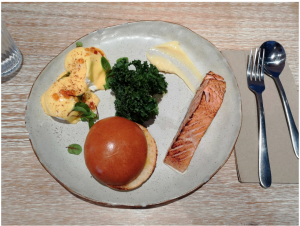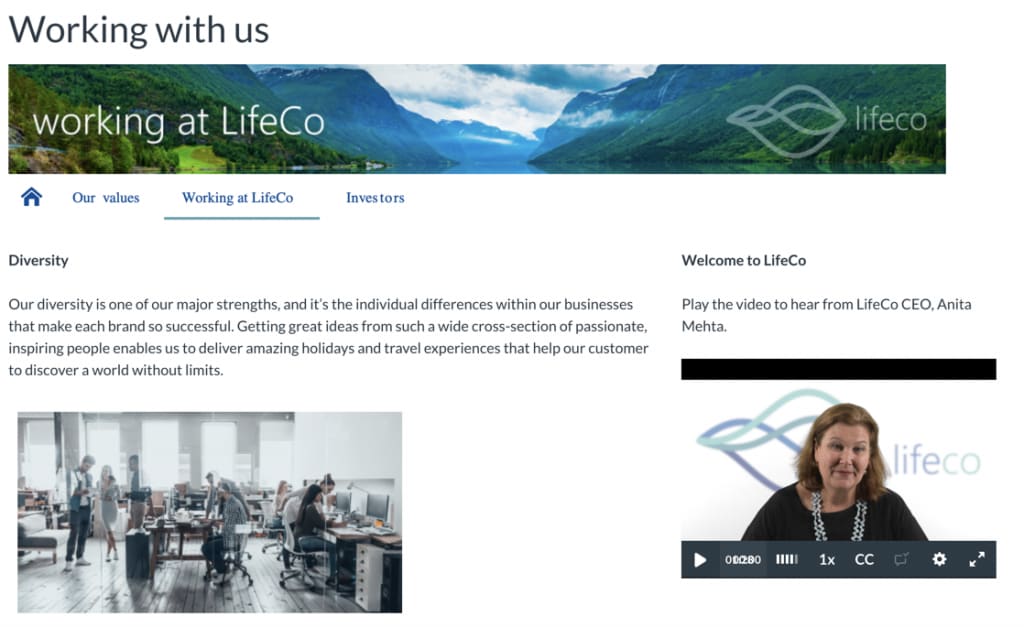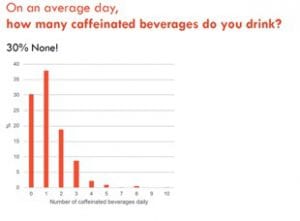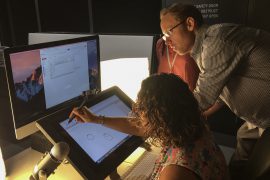The start of the 2020 academic year marks the two-year birthday for the Open Learning Environment – we’re learning to walk! Across the University we now run over 120 active OLE units covering a huge breadth of topics; from programming languages to the World Heritage List, and from animal welfare to cryptocurrency, among many others. One of the great things about developing an OLE unit from a design perspective is the ‘open’ part of the Open Learning Environment – you can access any and all 0cp units from your Canvas dashboard. Jump in to see how students learn Hanyu Pinyin in Experience China, or how they acquire skills in data exploration and interpretation in Shark Bites and Other Data Stories.

In order to celebrate the start of the terrible twos, the Educational Innovation portfolio held an event at the end of 2019 that showcased just a few of the great OLE units currently part of our Table O offerings. One thing in particular that stood out to me was the incredible variation not just in topic, but in approach. Each unit, pedagogically, was very different from the next. So, in true ‘open’ spirit, this T@S article will present particularly interesting and innovative aspects of each of the units showcased at our event in a way that will help you, regardless of where you are on your OLE journey.
Getting started – planning and developing your OLE unit
Economics of the Everyday – OLEO1138/OLET1139
Choosing the right conceptual approach to take when developing an OLE can be tricky, but Stephen Whelan from the Department of Economics looked to the New York Times bestseller Freakonomics when developing Economics of the Everyday. Chapters from the book, articles from The Conversation, TEDx talks, and Freakonomics podcasts co-exist alongside bespoke content developed for the unit, seamlessly blending an easy introduction to what can be a very complex field with great exemplars of the ways in which economic thinking can explain the world. The unit is structured around easily digestible topics; the economics of life and death, of love and marriage, and of crime and punishment, and even OkCupid and the Sydney lockout laws feature. The unit structure also makes it really easy to keep the content relevant to current events – I’ve heard that in 2021 plastic bag bans may feature… A small content refresh each year, whether it be an entire module or an extra case study from a visiting colleague, will keep your OLE up to date. So, if you’re looking to develop an introductory OLE it could be a good idea to look to what’s already making headlines from your discipline!
““.. I found the Freakonomics podcasts extremely interesting. This OLE unit has prompted me to seriously consider switching my major from Finance to Economics.” – USS feedback

Health Challenges: Diabetes – OLEO1503/OLET1504
In scoping and planning this OLE unit Peter Thorn, from the Faculty of Medicine and Health, aimed to keep things really simple. At the end of this unit, students should understand diabetes well enough to explain to someone in a café. Unit learning outcomes are all based around the understanding and dissemination of knowledge about diabetes, and unit assessments follow this. Each of the three unit modules give students multiple opportunities to test and demonstrate their knowledge, and encourage them to consider how a person with diabetes navigates the world. In one discussion board post students discuss their experience with the disease, and in another they provide a picture of their dinner and calculate its macronutrient values, much as a diabetic would in calculating how much insulin to inject before eating. For the unit’s final assessment students must record a video in response to a scenario where a better understanding of diabetes is key; a recently-diagnosed niece, or a funding drive to support research. Thus, at the end, the unit wraps around really clearly to the unit’s main goal. Aligning content, activities, assessments, and mostly importantly student learning to such a simple and practical goal keeps things straightforward for both teaching staff and students.
Aboriginal Sydney – OLEO1100/OLET1101
Aboriginal presence in the city of Sydney can often be invisible to non-Aboriginal eyes, and this unit encourages students to consider how dominant narratives can exclude diverse knowledges and experiences. In designing Aboriginal Sydney, Gabrielle Mundine and Erin Quinn Quirke drew extensively upon pre-existing video resources produced by and for the National Centre for Cultural Competence, providing students with high quality, relevant learning materials. The videos incorporate a diverse range of Aboriginal voices – elders, artists, curators, activists, teachers, and academics, to name just a few. The unit also pairs learning about Aboriginal experiences with a skill fundamental to cultural competence – that of critical self-reflection. Like most OLE units Aboriginal Sydney is blended in teaching style, but utilises the face-to-face classes to begin to teach this particular skill. Critical self-reflection can take a lifetime to master, but the difference in submitted work between students who attend the classes and those who do not has made very clear the difference even a little instruction can make. This very directed and specific use of on-campus time is pedagogically practical, and ensures maximum benefit for students and markers (and also encourages attendance at the classes!).
Laying the foundations – designing content and engaging students in your OLE unit
Business Ethics – OLEO1204/OLET1205
Applying conceptual knowledge to real-world scenarios is an integral part of learning in the Business School, and in Business Ethics Catharine Berger-Campbell and Wes Hamilton-Jessop were faced with the challenge of doing so in an online environment. The unit asks students to consider the ways in which ethical challenges are approached and managed in the business world, and what better way to do this than by building a fictional company into your unit? LifeCo, a travel company, and research vlogger Fergus Jaegar are used to guide students through the unit, and serve as a base from whence to ask questions about ethics in business. Design-wise LifeCo is quite straightforward, a cleverly-designed Canvas site, but the company’s story is built upon through the use of Fergus’s insights, and further explored through the use of real-world examples. Relevant information about LifeCo (stakeholders, leadership, company structure, etc.) is introduced slowly, with commentary about their operation given by expert voices within the University, and an ‘insider experience’ given by Fergus. The LifeCo scenarios make up the 0cp unit, so head in and take a look!

Numbers and Numerics – OLEO1621/OLET1622
Did you know that you and a computer may calculate 0.1 x 1,000,000 differently? While you’ll probably end up with 100,000, a computer could give you 100,958.3. This unit, developed and taught by the School of Physics, introduces students to numerical computing, or in lay terms the use and manipulation of numbers by computers to solve real-world problems in disciplines including science, engineering, finance, and medicine. The unit explores the ways in which computers represent numbers, and the limitations of these systems of representation that you have just seen. While this seem a bit dry on the surface, Tara Murphy and Michael Wheatland use real-world examples of catastrophes and crises caused by mistakes in computational calculations to illustrate the importance of considering how computers may understand numbers differently to us. The explosion of the first Ariane 5 test flight in 1996, the crash of the Vancouver Stock Exchange between 1982 and 1984, our frustration with how terribly inaccurate weather predictions often are… These can all be understood and explained with a grasp of how computers work with numbers. Each module in Numbers and Numerics begins with one of these real-world examples, giving students a soft landing into the content and a reference point for the bigger picture when the math gets tricky.

Health Challenges: Sleep – OLEO1509/OLET1510
Sleep! Something we all need, but something we rarely do well, or enough. Bad sleep leaves us unhappy, unproductive, and accident-prone, and research has shown that our students are a high risk population. This unit introduces them to this everyday fact of life from a scientific perspective, looking into how it works, what makes it good and bad, and how science studies and helps us learn to do it better. Developed by academics from the Charles Perkins Centre, the fully-online Health Challenges: Sleep OLE unit has been designed to show how interdisciplinary collaboration can provide new solutions to a surprisingly complex problem. In developing this unit Yu Sun Bin and Peter Cistulli thought deeply about how the online-only format would need to be considered in welcoming and engaging students, and the strategy they landed on used a combination of new and existing data. Knowing Your Students was utilised to create a page titled ‘Who are the students in OLET1510’, so that students could ‘see’ themselves within their cohort. The results of surveys administered at various stages within the unit progression were also returned to students, so they could both be part of active research, and situate themselves relative to their cohort on things like sleep habits and caffeine consumption. Participation in discussion boards where students shared their sleep-related experiences and knowledge was also a completion requirement.
With thanks to our wonderful colleagues who presented at the showcase – Tara Murphy, Erin Quinn Quirke, Yu Sun Bin, Stephen Whelan, Catharine Berger-Campbell, Wes Hamilton-Jessop, and Peter Thorn.





